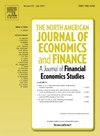Do oil price changes contain useful predictive information about the U.S. bear stock market?
IF 3.8
3区 经济学
Q1 BUSINESS, FINANCE
North American Journal of Economics and Finance
Pub Date : 2025-05-28
DOI:10.1016/j.najef.2025.102464
引用次数: 0
Abstract
This paper investigates the predictive power of -month oil price changes (characterizing oil market trends) for the U.S. bear stock market. We find from both in-sample and out-of-sample evaluations that -month oil price changes with can strongly predict the bear stock market, but conventional oil predictors fail to have predictive power. In particular, a higher current oil price relative to its level months ago will induce a higher probability of bear stock market in the future and the 48-month oil price change performs best at most of the forecast horizons considered. These results are robust to different subsamples, oil price series, estimation schemes for out-of-sample analysis, and phases of the business cycle. Moreover, the information provided by the 48-month oil price change covers that of inflation rate and does not completely overlap with that provided (individually or jointly) by non-oil predictors so that forecast improvement can be achieved by taking it into account.
油价变化是否包含了美国熊市的有用预测信息?
本文研究了近一个月石油价格变化(表征石油市场趋势)对美国熊市的预测能力。我们从样本内和样本外的评估中发现,随κ>;12的κ月油价变化可以很好地预测熊市,而传统的石油预测指标却不具备预测能力。特别是,目前的油价相对于k个月前的水平较高,将导致未来股市出现熊市的可能性更高,而且在考虑的大多数预测范围内,48个月的油价变化表现最好。这些结果对不同的子样本、油价序列、样本外分析的估计方案和商业周期阶段都具有鲁棒性。此外,48个月石油价格变化提供的信息涵盖了通货膨胀率,与非石油预测者提供的信息(单独或联合)并不完全重叠,因此可以通过考虑它来实现预测的改进。
本文章由计算机程序翻译,如有差异,请以英文原文为准。
求助全文
约1分钟内获得全文
求助全文
来源期刊
CiteScore
7.30
自引率
8.30%
发文量
168
期刊介绍:
The focus of the North-American Journal of Economics and Finance is on the economics of integration of goods, services, financial markets, at both regional and global levels with the role of economic policy in that process playing an important role. Both theoretical and empirical papers are welcome. Empirical and policy-related papers that rely on data and the experiences of countries outside North America are also welcome. Papers should offer concrete lessons about the ongoing process of globalization, or policy implications about how governments, domestic or international institutions, can improve the coordination of their activities. Empirical analysis should be capable of replication. Authors of accepted papers will be encouraged to supply data and computer programs.

 求助内容:
求助内容: 应助结果提醒方式:
应助结果提醒方式:


